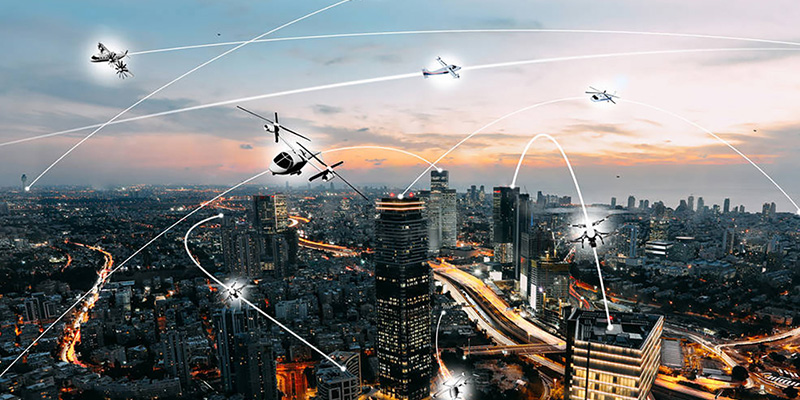Image credit: NASA
In an era of rapid technological advancement and stringent regulatory requirements, robust research and development initiatives are vital for driving innovation, enhancing safety, and ensuring the successful integration of new technologies into real-world applications. Aurora Flight Sciences, a Boeing Company, is at the forefront of this effort, collaborating with leading universities through initiatives like NASA’s University Leadership Initiative (ULI). These initiatives not only enhance educational opportunities for students but also drive the development of cutting-edge technologies that will shape the future of flight.
“Our involvement in these initiatives reflects our dedication to not only advancing technology but also nurturing talent in the aerospace field,” said Jessica Edmonds, senior director of Applied Research and program lead for Aurora’s ULI projects. “Being part of these projects allows us to be a part of industry-leading research conducted by universities, and to share our knowledge and experience with students, which is incredibly rewarding.”
Aurora offers relevant experience to these university-led research projects, including:
- Providing industry insight, technical expertise, and data to help university teams navigate complex aerospace challenges and develop effective solutions.
- Participating in project reviews to align university research with industry needs.
- Providing tools and platforms for real-world simulation and flight testing.
Aurora has participated in six ULIs across a variety of industry topics from urban air mobility (UAM) to battery development. Projects typically last between three to five years, allowing for in-depth exploration and innovation.
Communication-Aware Autonomy
Aurora was recently selected by the University of Colorado Boulder to provide tools and techniques for understanding and exploiting the dynamic communication environment experienced by collaborative autonomous aviation systems.
“This project aims to enhance safety, efficiency, and collaboration of autonomous air systems, paving the way for advanced communication, coordination, and navigation in shared airspace,” said Luke Burks, AI/ML research scientist at Aurora. “Our flight test capabilities and autonomy experience will be invaluable to tackling the challenges of communication-aware planning, routing, and design.”
The team plans to use Aurora’s SKIRON-X sUAS for a flight test to showcase the resulting techniques. Aurora will also help define assessment scenarios for the SKIRON-X flight test and explore opportunities for transitioning project outcomes into practical applications.
Battery Modeling and Energy Consumption
Aurora Engineer and Technical Fellow Jeff Saunders will support a Baylor University project that focuses on battery modeling and operations, specifically exploring effective charging methods.
“This battery technology project will be crucial for the future of UAM,” said Saunders. “The project not only looks at how to charge batteries effectively but also how to create a robust infrastructure that supports efficient energy management across the UAM landscape.”
The team plans to in build and test batteries while investigating viable chemistries for UAM. This research will involve acquiring several batteries to assess their performance and suitability for future applications. It will also require close collaboration with other organizations and utilizing machine learning and data-driven models that can be applied in operational contexts. The goal is to establish a robust infrastructure across the UAM landscape, ensuring optimal charging availability at each vertiport and effectively managing energy resources.
Urban Air Mobility
From 2021 to 2024, an Aurora team worked on a ULI project led by the University of California San Diego (UCSD) that was aimed at advancing vehicle design for urban air mobility. Through the project, titled “Rapid Development of Urban Air Mobility Vehicle Concepts through Full-Configuration Multidisciplinary Design, Analysis, and Optimization,” the UCSD-led team developed an open-source software framework for large-scale multidisciplinary design, analysis, and optimization (MDAO). This tool allows engineers to input desired parameters for a vehicle and use those requirements to determine the vehicle design aspects that will best fit the user’s needs.
“The ULI ended in 2024 with the completion of a python-based MDAO framework for aircraft design called CADDEE, and the development of several medium-fidelity tools for analyzing aerodynamics, structures, propulsion, and acoustics,” said Lauren Wolfe, aircraft conceptual design engineer at Aurora. “The effort was a collaboration between several universities, government, and industry partners, and Aurora performed verification and validation of these tools using our own tools and methods, as well as our experience designing, building, and testing the eVTOL vehicles.”
Aurora is now working on a follow-on effort supported by the NASA Transformational Tools and Technologies (TTT) project, which will further develop these large scale MDAO tools for use in industry. The TTT effort, also led by UCSD, aims to add a modernized aerodynamic flow solver called a panel code to the MDAO framework and show the validity of large-scale MDAO for industry-level design problems. The project will use industry standard and novel aircraft concepts as verification and validation cases.
These university-led projects promote collaboration between students and industry partners and support the transition of university-developed technology to real-world applications in the industry.
Learn more about Aurora’s research and technology capabilities here.


